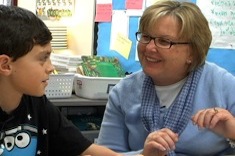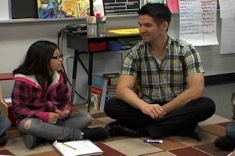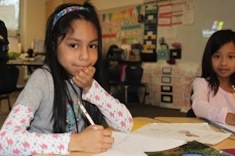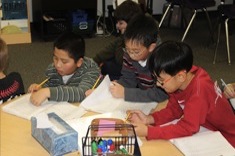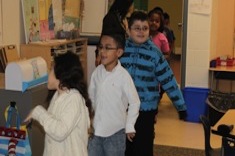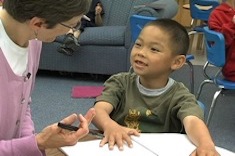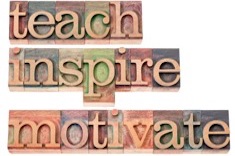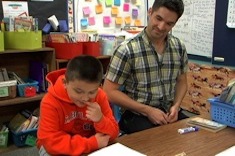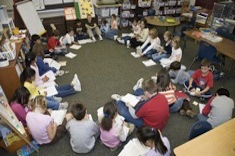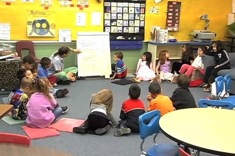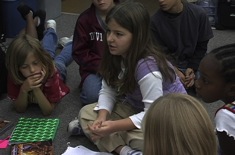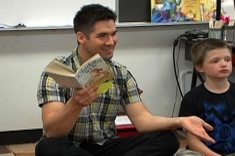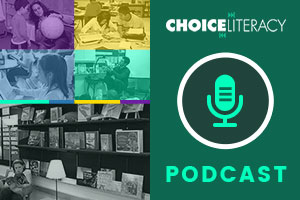Library
Choice Literacy Articles & Videos
The Choice Literacy library contains over 3,000 articles and 900 videos from 150+ contributors. Classic Classroom and Literacy Leadership subscribers have access to the entire library. Content is updated continuously, with five to six new features published each week.
Latest Content
Catching Up with Tommy
Karen Terlecky meets with Tommy, a boy who has flown under the radar for a few weeks in her fifth-grade reading workshop.
Second Grade Whole-Class Share: Adding Details and Descriptive Language Part 4
In this final video from a four-part series, Sean Moore asks students to share their writing with peers and the whole class.
Second Grader Student Mentor Text: Adding Details and Descriptive Language Part 3
In this third video from a four-part series, Sean Moore has a student share his writing as a mentor text for the class.
Happy Holidays from Choice Literacy and Pete the Cat
Wishing you and yours a totally groovy Pete the Cat holiday season.
The Big Fresh December 15, 2012 Visitor Ball
In this week’s Big Fresh, we consider the value of rituals and traditions.
I Have Two Pictures of Cindy. . .
Melissa Kolb writes about the importance of time and patience in meeting our goals with young learners — in this instance, a child who struggles to speak in her preschool classroom.
Choice and Reading Response
As more intermediate classrooms become departmentalized, grades 4-6 teachers find they are dealing with 80 or more reading response logs instead of 25-30 each week. Katherine Sokolowski tackles the issue of providing personal response to readers and still having time for everything else.
Teaching the Rule of Three to Writers
Aimee Buckner finds that teaching the rule of three to young writers adds variety to student texts.
The Big Fresh December 8, 2012 Go Go Gadgets
This week’s Big Fresh focuses on authentic writing and summaries.
Eliminating the Conga Line: Teaching Young Children About Strategic Thinking
Clare Landrigan and Tammy Mulligan manage to synthesize workspace cleanup, student independence, and a concrete analogy for strategy work in classrooms.
Hearing Carlos: Helping Young English Language Learners Develop Speaking and Listening Skills
Stella Villalba incorporates more speaking and listening activities into her primary classroom for English language learners.
Writers Inspiring Writers
Melissa Styger invites colleagues and family members into the classroom to share their writing process with students.
Rethinking Mrs. T Letters
Karen Terlecky reconsiders one of her favorite writing assignments.
Second Grader Conferring: Adding Details and Descriptive Language Part 2
In this second video from a four-part series, Sean Moore confers with a student about adding details to his writing.
Previewing a Read Aloud
Franki Sibberson previews a read aloud with her grades 3 and 4 students.
Interactive Writing and Formative Assessment in Kindergarten
Not content to use assessments designed for older students, Mandy Robek combines interactive writing and formative assessments in her kindergarten classroom.
Teachers’ Night Out: Reclaiming Our Fearlessness
It’s hard to keep your teaching mojo high when standards are grinding you down. Gretchen Taylor is inspired by watching an aerial performer to consider harnesses and fearlessness in a new way.
The Big Fresh December 1, 2012 Acceptable Alternatives
Peers helping peers is the focus of this week’s Big Fresh.
Book Matchmaker: Fairy Tales for Older Readers
Renew older students' interest in fantasy and fairy tales with these suggestions of recent titles from Franki Sibberson.
Peer Conferring: The “Try It On” Phase
Amanda Adrian continues her series on how teachers can scaffold and model peer conferring. In this installment, Amanda uses the fishbowl technique with students.
Second-Grade Writing: Adding Details and Descriptive Language
In this first video from a four-part series, Sean Moore leads a writing workshop focused on adding more details and descriptive language to writing. He begins with the classic Charlotte’s Web as his mentor text.
Literacy in Content Areas: A Podcast with Penny Kittle
Penny Kittle talks with Franki Sibberson about how to help students grow as readers and writers throughout the curriculum.
Poetry Friday in the Computer Lab
Mary Lee Hahn provides a wealth of web resources and practical suggestions for using technology for poetry instruction.
Poems Facing Art: Ekphrasis
Shirl McPhillips considers ekphrasis (poetry inspired by art) in her own poetry and reflection.
Value-Added: Moving Assessments from “Inflicted” to “Student-Owned”
Gretchen Taylor looks closely at the superficial reading responses of one student, and then uses a mid-year assessment to challenge all of her middle school readers to think, talk, and write more deeply about their reading.
Poetry All Year Long
Ann Williams shares how she builds a love of poetry in her fourth-grade classroom all year long.
Quick Sketch Practice
Linda Karamatic uses quick sketches to teach her second graders about sensory images in reading. This is the second installment in a two-part series.
Owning Our Teaching: A Podcast with Vicki Vinton
Vicki Vinton chats with Franki Sibberson about teacher agency, student independence, and the Common Core in this podcast.
The Big Fresh November 17, 2012 Purse Pass
We feature some excellent resources for web-based video to support the Common Core in this week’s Big Fresh.
Evaluating the Literacy Classroom
Jennifer Schwanke remembers the awkward and stressful experience of being evaluated as a young teacher. In her work now as a principal, she’s developed her own criteria for evaluating teachers.
Browse Content By
Type
Category
- Assessment Tools
- Big Fresh Archives
- Booklists
- Choice Numeracy
- Classroom Design
- Common Core
- Community Building
- Conferring
- Content Literacy
- Digital Literacy
- English Language Learners
- Equity
- Family Relations
- Free Samples
- Guiding Groups
- Leadership
- Literacy Coaches
- Mentor Texts
- Minilessons
- New Teacher Mentors
- Podcasts
- Poetry
- Quote Collections
- Reading Strategies
- Self Care
- Struggling and Striving Learners
- Talking and Listening
- Teacher Study Groups
- Teaching Reading
- Teaching Writing
- Word Study and Vocabulary
Author
- Melissa Quimby
- Nawal Qarooni
- Gwen Blumberg
- Julie Cox
- The Lead Learners
- Hannah Tills
- Josie Stewart
- Ruth Metcalfe
- Mallory Messenger
- Becca Burk
- Jodie Bailey
- Vivian Chen
- Mary Brower
- Tiffany Abbott Fuller
- Stephanie Affinito
- Ruth Ayres
- Leigh Anne Eck
- Heather Fisher
- Shari Frost
- Julie Johnson
- Suzy Kaback
- Gigi McAllister
- Shirl McPhillips
- Melanie Meehan
- Cathy Mere
- Debbie Miller
- Tara Barnett and Kate Mills
- Tammy Mulligan
- Dana Murphy
- Bitsy Parks
- David Pittman
- Brenda Power
- Heather Rader
- Matt Renwick
- Mandy Robek
- Christy Rush-Levine
- Gretchen Schroeder
- Jen Schwanke
- Brian Sepe
- Katherine Sokolowski
- Stella Villalba
- Jennifer Vincent
Grade Level
Choice Literacy Membership
Articles
Get full access to all Choice Literacy article content
Videos
Get full access to all Choice Literacy video content
Courses
Access Choice Literacy course curriculum and training

